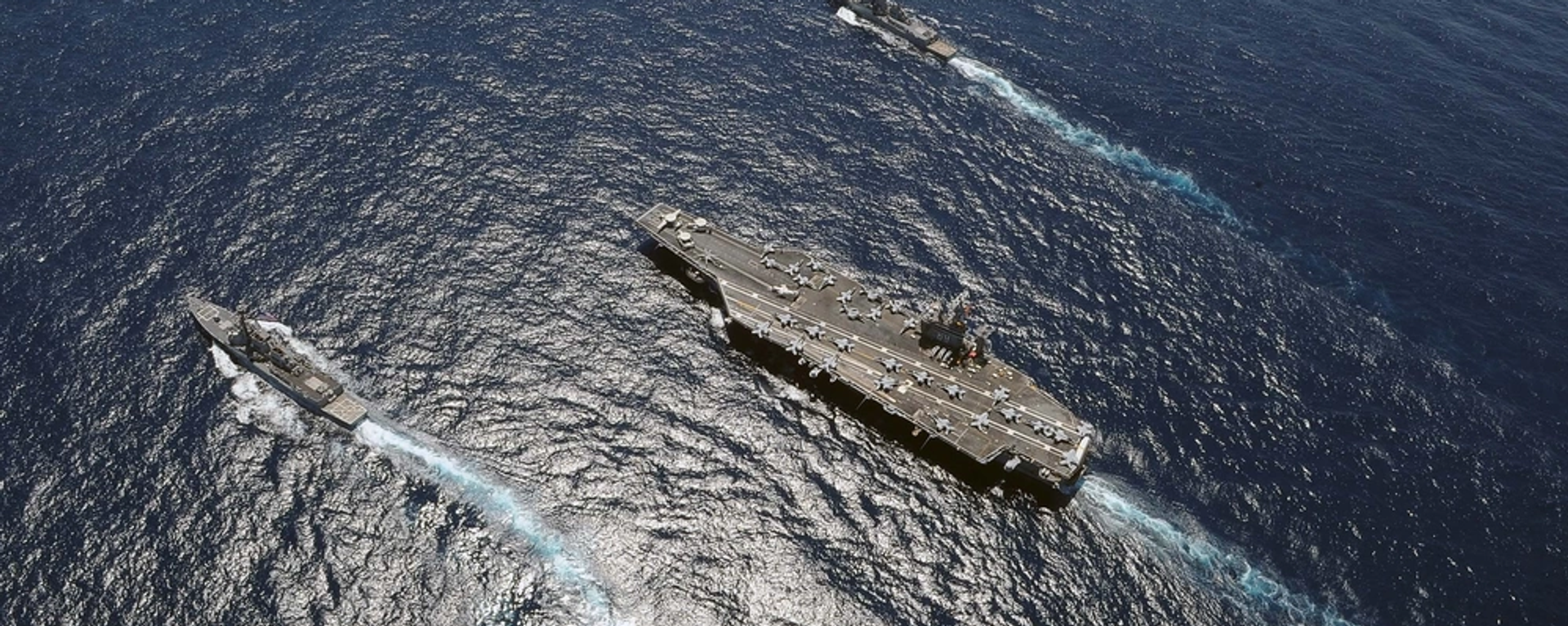Shipping Companies’ Fiddling With Tracking Data to Avoid Houthi Attacks Has Opposite Effect
18:52 GMT 06.04.2024 (Updated: 18:53 GMT 06.04.2024)

© AFP 2023 / MOHAMMED HUWAIS
Subscribe
The Yemeni militia effectively shut down the Red Sea and the Bab el-Mandeb Strait to Israeli, British and US commercial maritime traffic via a campaign of hijackings, missile and drone attacks. The US and Britain began a relentless bombing campaign in January to try to deplete the group's capabilities, but have reportedly had little luck to date.
Efforts by shipping companies to disguise their vessels’ identity and origin from the Houthis by manipulating data shared with the Automatic Identification System (AIS) may be having the opposite effect, turning them into priority targets for the militia, Hellenic Shipping News has reported.
Pointing to the escalating cost to Western economies of taking the long way around Africa for cargoes being shuttled between Europe and Asia, the outlet indicated that the “seemingly random missile strikes against ships with even a subtle connection to Israel, the US or the UK” by the Houthis bear little in common with traditional pirate activities in the area because the militia has no interest in holding ships for ransom.
Some shipping companies risking attack to sail through the Red Sea have resorted to manipulating data shared with the AIS – a short-range automatic coastal tracking system which supplements marine radar to help avoid collisions at sea.
“In the past, ships moving between the Suez Canal and the Gulf of Aden have manipulated the system to signal their security status, in the hopes of deterring pirates by making themselves seem like less attractive targets,” HSN explained. “This was achieved by altering a field in the AIS data designed to indicate the vessel’s sailing destination. Some ships used this field to communicate different messages, such as ‘Armed Guards on Board’, which served both to obscure their intended destination and to imply that protective measures were in place.”
But using these masking measures against the Houthis only seem to turn ships into more attractive targets, according to the outlet, with altered AIS readings making them look “more belligerent and potentially harmful,” while reporting armed guards onboard does nothing to deter a missile or drone.
“After the initial attacks, there has been a considerable decrease in vessels claiming to have this kind of protection onboard. Instead, more ships are editing their AIS data to explicitly state they have no ties with Israel, using phrases like ‘No Contact Israel’ or declaring that the vessel or crew is entirely Chinese with ‘All Chinese’ status,” the report indicated – adding that even this doesn’t always guarantee safety.
Accordingly, “there is no strong evidence yet that ships which modify their AIS data are any more effective at staving off Houthi attacks than those that do not,” the outlet noted, adding that an observable decline in AIS signals in the Red Sea indicates a decline in traffic, and/or more ships sailing through with their AIS equipment turned off.
The Houthis movement, formally known as Ansar Allah, kicked off their Red Sea blockade in November 2023 to mark their solidarity with Gazans with the seizure of the Galaxy Leader, an Israeli billionaire-owned ro-ro car carrier, expanding their operations to include the targeting of commercial ships with suspected ties to Israel using drones and missiles. Major global shipping companies responded by rerouting their vessels, adding tens of billions of dollars to transportation and insurance costs, and prompting a 50-60 percent drop in traffic through the Red Sea.
The US responded by forming a ‘coalition of the willing’ in December, and in January, in coordination with the UK, began a bombing campaign targeting the Houthis. Ansar Allah leader Abdul Malik al-Houthi reported this week that Yemen has faced 424 airstrikes and shelling attacks to date, with 37 people killed and 30 more wounded.
Al-Houthi said the joint US-UK operations had proven their “inability to prevent or limit operations,” and that “the Yemeni armed forces have achieved very important results,” including 34 attacks targeting US, British and Israeli targets over the space of the past month, firing 125 ballistic and cruise missiles and drones, and targeting 90 ships since the start of the operation in November, including 86 vessels affiliated with Israel, the US or the UK.
The Biden administration, which admitted almost from the start of the bombing campaign in January that airstrikes were not working, offered the Houthis an olive branch this week, indicating that Washington could revoke the Houthis’ ‘terrorism’ label if the group stopped its Red Sea campaign.
“My hope is that we can find diplomatic off-ramps,” Biden special envoy for Yemen Tim Lenderking told reporters on Wednesday. “To find ways to deescalate and allow us to pull back, eventually, the designation and of course to end the military strikes on Houthis’ military capability,” Lenderking added.
It seems unlikely that the Houthis, who have no discernable assets in the US to freeze, and have already endured nearly a decade of crushing sanctions and blockade by Washington’s Gulf allies, would agree to a deal with the US at this stage. Instead, the group has emphasized repeatedly that they will be ready to end their partial blockade of the Red Sea once Israel stops its war in Gaza.
Part of the reason for the new conciliatory tone coming from Washington may be the anti-Houthi campaign’s price tag. The Hill reported last month that the US military has been using $2 million and $4 million apiece SM-2 and SM-6 SAMs to bring down Houthi drones priced at $2,000 apiece, and taking losses in drone capabilities as the Houthis shoot down $32 million apiece Reaper drones using upgraded Soviet-era missiles.



